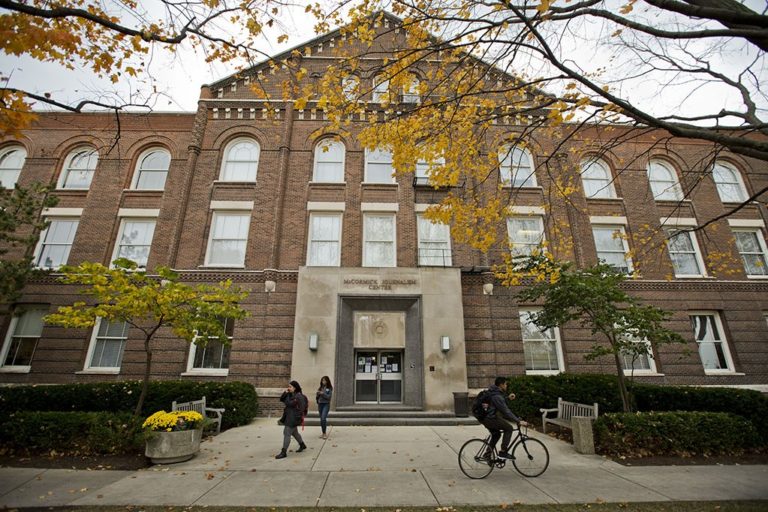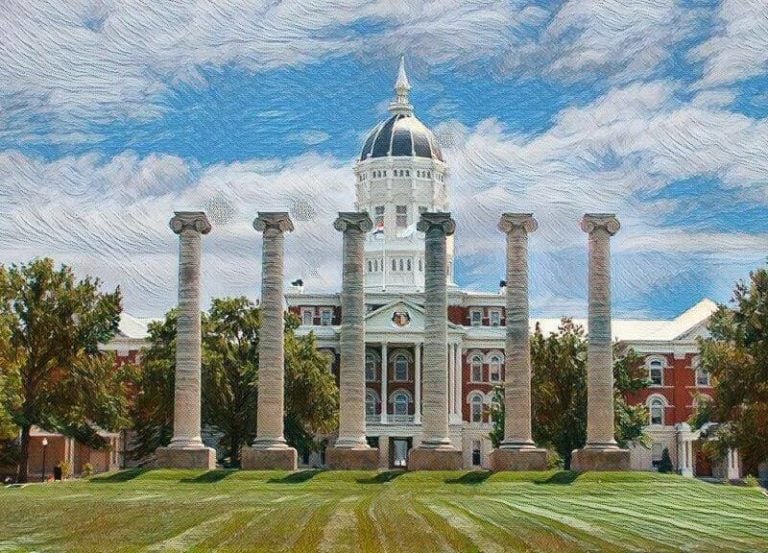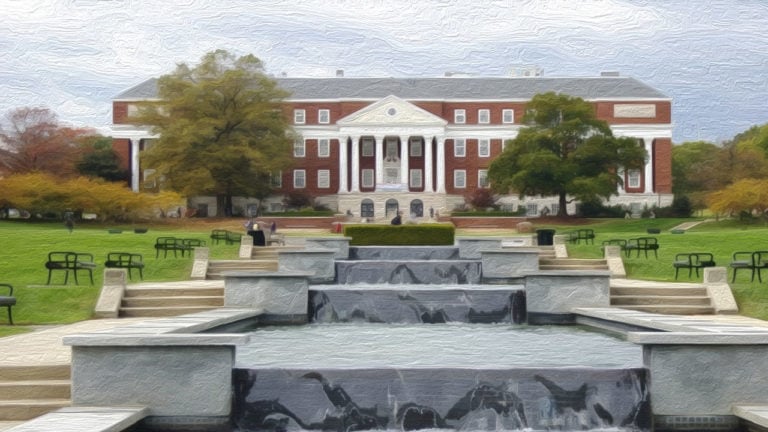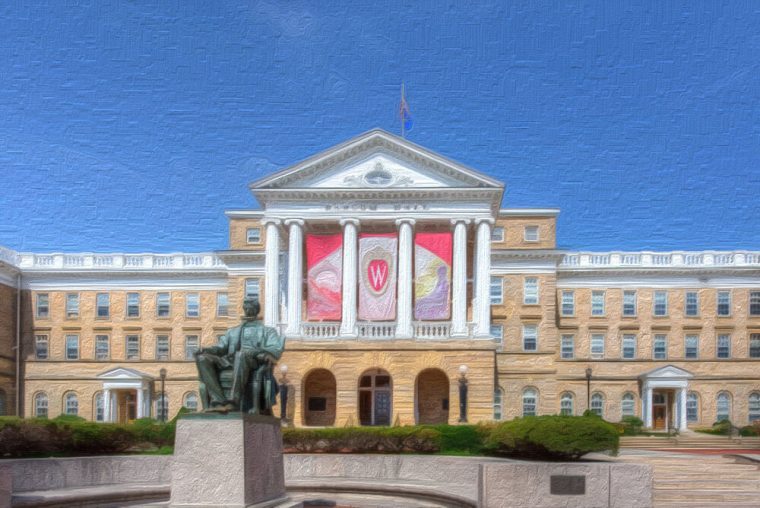| Rank | School | Location |
|---|---|---|
| 1 | Columbia University In The City Of New York | New York, NY |
| 2 | University of California, Berkeley | Berkeley, CA |
| 3 | Northwestern University | Evanston, IL |
| 4 | University of Missouri, Columbia | Columbia, MO |
| 5 | University of Maryland - College Park | College Park, MD |
| 6 | Arizona State University | Tempe, AZ |
| 7 | University of Illinois, Urbana-Champaign | Champaign, IL |
| 8 | University of Wisconsin-Madison | Madison, WI |
| 9 | CUNY School of Professional Studies | New York City, NY |
We have ranked the best Investigative Journalism master's degrees in the U.S. This ranking is designed for prospective master's students to be informed of college and degree options.
This ranking is based on the academic influence of these schools in Investigative Journalism. The academic influence is determined by looking at the publications and citations from the faculty and alumni of these schools.
This approach is beneficial to students because it shows that the students will be immersed in academic environments best suited to learning Investigative Journalism by faculty involved and influential in the subject. These are on-campus programs.
A master's program in Investigative Journalism is a natural choice for students who already have a bachelor's degree in Journalism. Students may also pursue more general graduate programs in Journalism that aren't specialized.
Schools may download our badge.
Featured online degrees:
The Best Investigative Journalism Master's Degrees
Columbia University In The City Of New York
New York, NY

The School of Journalism at Columbia University is one of the oldest and most comprehensive programs available to students. With a history that dates back to Joseph Pulitzer, the School continues to uphold the values of excellence, innovation, leadership, and dedication.
Students have 12 areas of journalism study to choose from including data, investigation, multimedia, audio, international, and writing. Students can pursue the Master of Science, the Master of Arts, dual degrees, or doctorate programs.
Several professional development classes for non-degree students are also available. Both the MS and the MA offer students ample opportunity to learn investigative reporting techniques. Students in the MS program may apply to the Toni Center for Investigative Journalism.
The Toni Stabile Center for Investigative Journalism offers students further classes, as well as financial and editorial support. The Center has alumni that have worked at The New York Times, Buzzfeed, The Wall Street Journal, and more.
In addition to the general required classes for all journalism students, those in the Investigative Journalism program also take an Investigative Tools class and an Investigative Seminar. The Center encourages students to travel, and pursue fellowships.
Credit requirements:
Selection of required courses:
- The Written Word
- Image and Sound
- Investigative Techniques
- Journalism Essentials
Students complete the program with the Master's Project.
Learning enrollment options: Full or part time
Program length: Approximately 10 months to two years depending on enrollment status.
Start dates: Full time students begin in August, part time students begin in May
Admissions and transfer credit information: Students must submit official transcripts, three letters of recommendation, resume, a personal essay, and journalistic work samples.
Students pursuing investigative or documentary programs must submit an additional specialized essay. The admissions team does not require GRE results, with the exception of certain dual degree programs.
The Master's programs through the School of Journalism do not accept transfer credits.
Accreditation: Columbia University receives accreditation from the Middle States Commission on Higher Education.
University of California, Berkeley
Berkeley, CA

Berkeley has the distinction of being the only school in the University of California system to offer graduate level study of Journalism, and is one of the few schools left in the nation to offer a two-year master's degree in the subject. Areas of concentration include:
- Audio Journalism
- Documentary
- Multimedia
- Narrative Writing
- Photo Journalism
- Video Journalism
The core program enrolls approximately 120 students in small class sizes under the instruction of master journalists. Students create a portfolio of published work in all media. Students also have access to much of the technology transforming journalism today.
In 2006 reporter Lowell Bergman established the Investigative Reporting program. The Investigative Reporting program includes courses, an annual symposium, a non-profit news room, post-graduate fellowships, and a recently developed non-profit production company called Investigative Studios. Students gain practical investigative, research and writing experience through the programs teaching-hospital model.
Publications such as The New York Times, Los Angeles Times, The Guardian, The Intercept and The Atlantic have published student work from the Investigative Reporting program.
Credit requirements: 36 semester units minimum
Selection of required courses:
- Reporting the News
- Multimedia Bootcamp
- Data Immersion Bootcamp
- Introduction to Visual Journalism
- Law and Ethics
- Reporting Internship
There are additional requirements for students interested in the Multimedia, Video Reporting and Storytelling, and Documentary concentrations.
Learning enrollment options: Full time
Program length: Two years, four consecutive semesters
Start dates: Fall semester only
Admissions and transfer credit information: In addition to undergraduate transcripts, the admissions team also strongly considers the personal essays, letters of recommendations, interviews, and work samples of the students.
Admissions does not accept transfer credits.
Accreditation: UC Berkeley receives accreditation from the Western Association of Schools & Colleges (WASC).
A Journalism minor program is available for undergraduates.
Northwestern University
Medill School of Journalism, Media, and Integrated Marketing
Evanston, IL

The Medill School of Journalism, Media, and Integrated Marketing offers both undergraduate and graduate level studies in these areas.
The Master's Journalism program offers specializations these subjects:
- Health, Environment and Science
- Magazine
- Media Innovation and Entrepreneurship
- Politics, Policy and Foreign Affairs
- Social Justice and Investigative Reporting
- Sports Media
- Video and Broadcast
The Social Justice and Investigative Reporting specialization allows students to investigate current popular issues including drug policy, criminal justice, and poverty and immigration. Students learn research and interviewing skills and have opportunities to network with the Medill News Service and the Social Justice News Nexus.
Alumni of the program have written for publications such as The New York Times and the Chicago Chronicles.
Credit requirements:
Selection of required courses:
- Ethics and Law
- Journalism Methods
- Frameworks for Modern Journalism
- Foundations of Video Journalism
- Foundations of Interactive Journalism
- News Reporting
Students complete the program with a Practicum or Master's Project.
Learning enrollment options: Full time
Program length: One year
Start dates: Summer or Fall
Admissions and transfer credit information: Students must submit previous transcripts, a Statement of Purpose, and two letters of recommendation. Additional requirements include GRE or GMAT test scores, resume, and an admissions interview.
Accreditation: Northwestern University receives accreditation from the Higher Learning Commission.
University of Missouri, Columbia
Columbia, MO

The Missouri School of Journalism offers both undergraduate and graduate level studies with on campus and online options for traditional and non-traditional students. The curriculum provides a comprehensive study of a variety of media fields with a liberal arts foundation and numerous hands-on training opportunities.
At the graduate level, students can create their own area of specialization to meet their career goals through a variety of elective classes. Several professional organizations and workshops support the classroom theories and give mid-career professional students the networking opportunities that benefit careers.
Students pursuing graduate studies in Investigative Reporting must have prior journalism experience or must have completed an introductory reporting class.
Credit requirements: 37 credits
Selection of required courses:
- Mass Media Seminar
- Quantitative Research Methods in Journalism OR Qualitative Research Methods
- Computer-Assisted Reporting
- Controls of Information
- Investigative Reporting
Students complete the program with a Professional or Capstone project.
Program length: Two years
Start dates: Fall or Spring
Admissions and transfer credit information: Students must submit previous transcripts, three application essays, a resume, GRE test scores, and letters of recommendation.
Accreditation: The Missouri School of Journalism receives accreditation from the Accrediting Council on Education in Journalism and Mass Communications.
University of Maryland - College Park
College Park, MD

The Philip Merrill College of Journalism offers undergraduate and graduate level studies. The curriculum maintains a liberal arts foundation while highlighting a skills-intensive, hands-on approach that prepares students for careers in media, research, and journalism.
At the graduate level students may choose from the Master of Arts in Journalism or the Master of Journalism. The MA program requires 30 credits and is thesis oriented, with classes best suited for experienced journalist.
The MJ program is a non-thesis program that does not require previous journalism experience. Students gain experience in a wide variety of platforms and may choose from three specializations: Sports Journalism Focus, Investigative Focus, or Computational and Data Journalism Focus.
The Howard Center for Investigative Journalism, just recently opened in 2019, assists students with networking opportunities and further education. Through this program students have worked internships at the Washington Post, Reuters, CNN, and The Wall Street Journal.
Credit requirements: 36 credits
Selection of required courses:
- Fundamentals of Writing and Editing
- Introduction to Multimedia Skills
- Theories of Journalism and Public Communication
- News Videography
- Seminar in Mass Media History
- Seminar in Public Affairs Reporting
Students complete the program with a capstone course.
Learning enrollment options: Full or part-time
Program length: 12 - 15 months average
Start dates: Fall only
Admissions and transfer credit information: Admission is highly competitive with only 36 students entering each year. Admissions requires previous official transcripts, a statement of purpose, three writing samples, and letters of recommendation.
Accreditation: The School of Journalism receives accreditation from the Accrediting Council on Education in Journalism and Mass Communications.
Arizona State University
Tempe, AZ

The Walter Cronkite School of Journalism and Mass Communication is a comprehensive division of Arizona State University offering undergraduate, graduate, online, and professional programs. Hands-on experience is a core part of the curriculum in any class. Professor encourage students to pursue dual degrees and global experience through internships.
The Master of Arts in Investigative Journalism program is one of the first of its kind in the country. The curriculum caters to students with previous professional experience. Classes are interdisciplinary in nature covering an array of investigative techniques and multimedia skills essential to success in the field.
An optional Summer experience is available for students interested in networking with the Carnegie-Knight News21 Program.
Credit requirements: 36 credits
Selection of required courses:
- Journalism Skills
- Ethics and History of Journalism
- Media Law
- Data Journalism
- Accountability Journalism
- Techniques of Investigative Reporting
Students complete the program with a Capstone course.
Learning enrollment options: Full or part time
Program length: 12, 15, or 20 months
Admissions and transfer credit information: Admission reviews applications on a rolling basis. Students must submit official transcripts showing a minimum GPA of 3.0, GRE scores, a personal statement, resume, and three letters of recommendation.
Accreditation: Arizona State University receives accreditation from the Higher Learning Commission.
University of Illinois, Urbana-Champaign
Champaign, IL

The College of Media offers students undergraduate and graduate studies in Advertising, Journalism, or Media and Cinema Studies.
Students who complete Journalism studies find careers as producers, web designers, public relations, speechwriters, multimedia reporters, and more. Faculty members include Pulitzer Prize winners with extensive hands-on experience to share with classes
The Master of Science in Journalism program is best suited for students with previous study or professional experience in the field. Courses provide a solid foundation in practical skills immediately applicable to any journalism related career. Students have three electives to work towards their career goals in a specialized area such as Investigative Journalism.
Credit requirements: 32 credits
Selection of required courses:
- Multimedia Storytelling
- Journalism Proseminar
- Current Issues in Journalism
Students complete the program with a Masters project
Program length: One full year, including a Summer session
Admissions and transfer credit information: Students must submit previous transcripts showing a minimum GPA of 3.0. Additionally, admission requires a 350-word personal statement and letters of recommendation. Admissions exempts students from submitting GRE scores if they are already a University of Illinois student or have an approved post-secondary degree.
Accreditation: The University of Illinois, Urbana-Champaign receives accreditation from the Higher Learning Commission.
University of Wisconsin-Madison
Madison, WI

The School of Journalism and Mass Communication at the University of Wisconsin is one of the oldest institutions of its kind in the country. Students have a well-rounded curriculum that emphasized critical thinking, problem solving, and innovation skills. Both undergraduate and graduate programs are available.
The Professional M.A. program allows students to construct their own unique curriculum. Students work with an academic adviser to develop a specialty in journalism which includes topics such as Investigative Journalism. Investigative journalism students often work with the Wisconsin Center for Investigative Journalism.
The curriculum requires students to complete 12 Core Skills credits, seven Journalistic Concepts credits, six electives outside of the School of Journalism and Mass Communication, and an internship. The program targets undergraduate students without experience seeking Journalism skills as well as general reporters seeking a specialization.
Credit requirements: 30 credits minimum
Selection of courses:
- In-Depth Reporting
- Creative Nonfiction
- Magazine Publishing
- Investigative Journalism
- Long Form Video
The only required course all students must take is Principles and Practices of Reporting.
Learning enrollment options: Full or part time
Program length: One and a half to two years for full time students
Start dates: Fall only
Admissions and transfer credit information: Students must submit previous academic transcripts from an accredited institution with a minimum GPA of 3.0. Students applying to the Professional MA program must submit writing samples.
Accreditation: The University receives accreditation from the Higher Learning Commission.
CUNY School of Professional Studies
New York City, NY

The Craig Newmark Graduate School of Journalism offers four comprehensive Masters programs for students interested in advancing their reporting careers. Students have the option of an MA in Journalism, an MA in Journalism with a unique Spanish-language component, an MA in Entrepreneurial Journalism, which is also available in a shorter Certificate format, or an MA in Social Journalism.
The 16-month Master of Arts in Journalism program offers students a variety of concentrations and specialty areas to choose from, including the specialty of Investigative Reporting.
The specialty classes for Investigative Reporting allow students to focus their skills on source identification, interviewing, and compiling and organizing data. Students gain in-depth knowledge of Freedom of Information Laws and how to work within ethical and legal constraints.
Credit requirements: 43 credits
Selection of required courses:
- Craft of Journalism I and II
- Legal and Ethical Issues
- Fundamentals of Multimedia Storytelling: Audio and Video
- Fundamentals of Multimedia Storytelling: Interactive Journalism
Learning enrollment options: Full time
Program length: 16 months
Admissions and transfer credit information: Applicants must submit official undergraduate transcripts along with a one-page resume, a personal statement of 1,000 words or less, three letters of recommendation, and three writing samples. GRE scores are optional. Students must submit all information online; admission does not accept hard copies. Admissions may also request an interview.
Accreditation: CUNY receives accreditation from the Middle States Commission on Higher Education.
What is Investigative Journalism?
Investigative Journalism is a form of journalism where the journalists themselves actively participate in understanding and reporting the story. Investigative journalists will often discover the story to be reported, and are not passively reporting on events with which they had no involvement. As the name implies, these journalists investigate any manner of story to report.
Investigative Journalists dig and get to the bottom to the truth, so as to uncover the story. Thomas Jefferson is credited with the quote: "Our liberty depends on the freedom of the press, and that cannot be limited without being lost."
A free press is essential for liberty. Investigative Journalists are an integral part of this, for they uncover things like corruption to the highest level, such as the Watergate scandal under president Nixon.
But Investigative Journalism is pertinent to all facets of life, not just political. It's also necessary to uncover crime and corruption in private domains.
Ranking methodology
Successful Student creates rankings for the benefit of students. In this Best Investigative Journalism Master's Degrees ranking, we looked at AcademicInfluence.com, which ranks school programs based on the academic influence of the schools' faculty and alumni in the field of Journalism.
We then looked at which Journalism programs have Investigative Journalism degrees. Our ranking then considered the variety of instruction and the Investigative Journalism degrees offered in particular, and the school's academic reputation.
For more information on our objective ranking methodology, such as the ranking factors (and their weighted amounts), see our College Denominator.
Career Information
According to the PayScale, Investigative Journalists earn $63,966.00 per year. Investigative Journalists work for media outlets, in radio, television, newspapers, internet-based news, and others outlets.
News Analysts, Reporters and Journalists make $55,960.00, according to the Bureau of Labor Statistics.